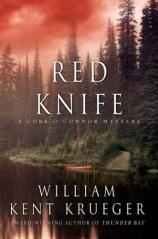Red Knife: A Cork O’Connor Mystery
Review
Red Knife: A Cork O’Connor Mystery
RED KNIFE revolves around our human capacity (some would say propensity) for violence and the many ways we try to justify it. Cork O’Connor, retired sheriff turned private investigator, is back at the center of the story --- which starts generations before he is born, in a meadow known to the Ojibwe, whose blood Cork shares, as Red Knife. The first chapter of the book recounts the stealthy raid by Ojibwe braves on what they view as trespassing Sioux hunters, through the eyes of a first-time warrior. He fulfills his part in the mission and kills his human prey, but not before noting that the boy he murders is even younger than him.
Fast forward 200 years, to when a high school is built on this very meadow and the Ojibwe have been relegated to a nearby reservation. Tensions are high in Cork’s town of Aurora due to a white teenaged girl’s death by drug overdose and the subsequent disappearance of the Ojibwe youth who sold her the drugs. The girl’s father is a local hothead named Buck Reinhardt, who makes no secret of his desire for revenge on drug dealer Lonnie Thunder.
Alexander Kingbird, the leader of an Ojibwe gang whose members call themselves the Red Boyz, phones Cork to ask him to set up a meeting between Buck and himself, for the purpose of administering “justice.” Cork tries to comply but is too late; by the next morning, Alexander and his wife Raylette have been brutally executed. Lucinda Kingbird comes to take Raylette to church and leaves with the young couple’s baby daughter, having discovered the bodies of her son and his wife.
Cork vows to help the woman who succeeded him as sheriff, Marsha Dross, by finding out what he can from his friends on the reservation, much to the annoyance of his wife Jo, who fears for his safety. His daughter Annie sings in church with the quiet and troubled Ulysses Kingbird, brother of the deceased gang leader. Lucinda’s steadfast, submissive love for her husband Will is tried by his taciturn, military ways and her suspicion that Will is determined to avenge his son’s death. And of course, where there are gangs, there are drugs.
As Cork slowly penetrates the myriad loyalties and deceptions between the parties, he is drawn into the local Ojibwe’s plan for justice, which culminates in its own spate of killings, which Cork tells himself are justified. But is killing ever justified? Cork may have a different answer after the final chapter, when a powerful rifle and a troubled youth put his own daughter at risk on the same ground that saw the bloody Ojibwe raid so long ago.
Having reviewed THUNDER BAY, another Cork O’Connor novel, I was eager to read RED KNIFE. Many of the same qualities that impressed me in THUNDER BAY are present in the current work: careful, accessible descriptions of people and places, thoughtful and sensitive characterization, and good pacing. However, I thought the ultimate chapter was both predictable and unbelievable, and not truly thematically linked with the rest of the book. William Kent Krueger has tackled a big subject here, but it feels like he uses a shotgun where a pistol would do.
Reviewed by Eileen Zimmerman Nicol on January 23, 2011





